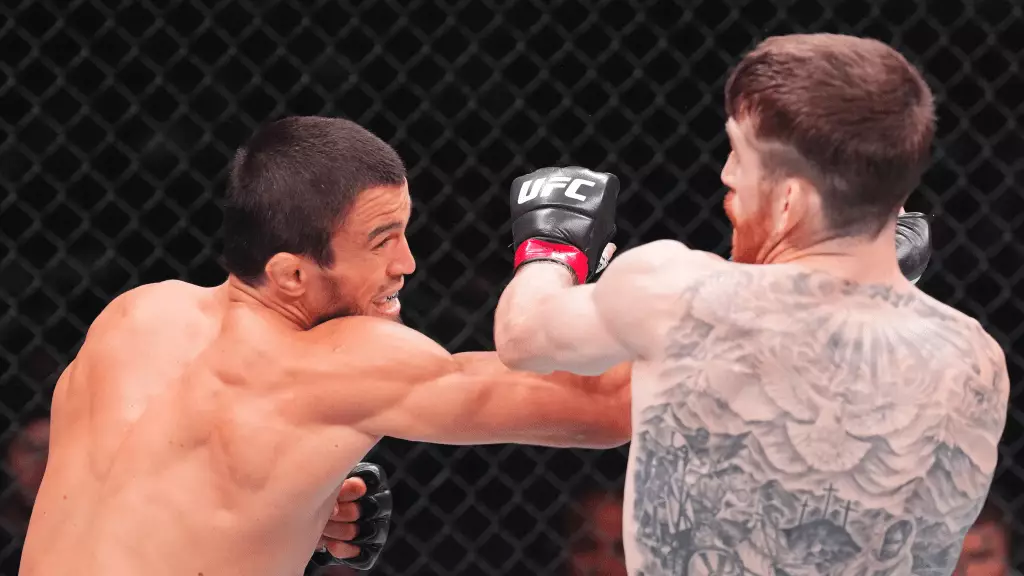In the dynamic world of UFC bantamweight competition, the upcoming clash between Umar Nurmagomedov and Merab Dvalishvili is poised to be one that could fundamentally shift the title landscape. Scheduled for January 18, in a co-main event at the Intuit Dome in Inglewood, California, this matchup has garnered attention not just because of the stakes, but also due to the intriguing perspectives shared by prominent fighters within the division. One such voice is that of Cory Sandhagen, who, despite recently being bested by Nurmagomedov, has publicly thrown his support behind the undefeated contender.
Cory Sandhagen’s predictions carry weight, especially following his own five-round decision loss to Nurmagomedov in August. His analysis of the fight reveals a tactical understanding of both fighters’ strengths and weaknesses. “I think that Umar probably will win,” Sandhagen remarked, illustrating not only his confidence in Nurmagomedov’s skills but also his skepticism about Dvalishvili’s fighting approach. Sandhagen believes that Merab will struggle to close the distance and effectively implement his wrestling against an adept striker like Nurmagomedov.
Sandhagen’s belief that Nurmagomedov will assert his striking, while maintaining superb defensive grappling, signals his assessment of the tactical battle that awaits. Highlighting Nurmagomedov’s “sniper-like” striking ability, he suggests that Dvalishvili may not find an avenue to exploit Nurmagomedov’s defenses. In sports, particularly in MMA, the strategic battle often defines the outcome, making Sandhagen’s insights a critical assessment of the fight dynamics.
A continued narrative throughout Sandhagen’s discourse has been Dvalishvili’s attitude toward Nurmagomedov, which he perceives as dismissive. Dvalishvili’s failure to recognize Nurmagomedov’s potential as a worthy opponent raises questions about sportsmanship and the essence of competition in combat sports. For athletes in this arena, it’s crucial to embody the spirit of fearless competition. Sandhagen articulately expresses that fans desire to see fighters who embrace challenges rather than shy away from them, labeling Dvalishvili’s stance as “acting a little ridiculous.”
Such a perspective invites a deeper conversation about the obligations of fighters not just to their own career ambitions, but also to the fans who support them. Sandhagen’s assertion that “people are not stupid” strikes at the heart of the relationship between athletes and their audience, emphasizing the importance of authenticity and courage in performance.
The backstory between Sandhagen, Nurmagomedov, and Dvalishvili adds layers of intrigue to the fight. Sandhagen’s experience in the octagon against both fighters gives him unique insight into their capabilities. His siding with Nurmagomedov also appears to stem from a personal connection, particularly rooted in his own competitive experiences. The statement, “I’m on Team Umar now,” reflects Sandhagen’s shift toward advocating for challenging and brave competition, which resonates deeply within the fabric of UFC culture.
Such dynamics of rivalry and alliance contribute to the narrative that makes UFC events so captivating. Unmistakably, fighters often navigate personal agendas alongside public personas, and Sandhagen’s endorsement may carry implications for collective fighter sentiment against Dvalishvili should he continue his current trajectory.
As UFC 311 looms on the horizon, the anticipation surrounding Nurmagomedov versus Dvalishvili reflects not only a high-stakes bantamweight title bout but also the broader implications it holds for the division. Cory Sandhagen’s insights underscore the need for authentic competition and the kind of spirited rivalry that elevates the sport. As the fight approaches, fans and analysts alike will undoubtedly keep a close eye on the matchup and its potential to redefine the bantamweight hierarchy. Ultimately, the clash signals much more than a mere title fight; it’s a pivotal moment within the evolution of a sport that thrives on narratives, rivalries, and the relentless pursuit of greatness.

